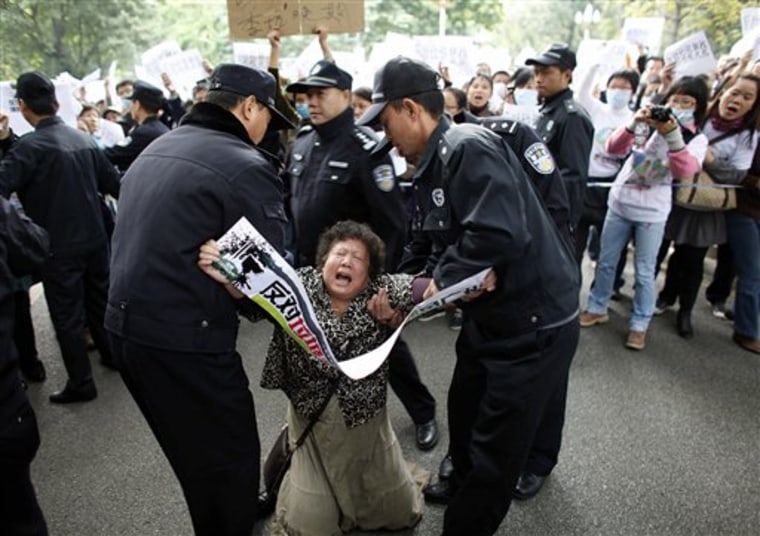Hundreds of residents worried about property values and health risks protested against the planned construction of a trash incinerator in the southern boomtown of Guangzhou.
Many of the demonstrators were members of China's growing middle class, who are eager to protect the homes, jobs and other benefits that rising living standards have afforded them. Their newfound wealth has also led them to expect more from the government.
For several months, public anger about the incinerator project in Guangzhou's Panyu district — home to 2.5 million people — has been simmering. But until now, police have been effective in blocking large-scale protests. Most of the opposition has been voiced on blogs and Internet chat forums.
Officials have assured the public that the incinerator wouldn't be built until a proper environmental assessment is conducted — though they haven't said when that will take place. Authorities have repeatedly defended the plan, saying it would be safe and wouldn't pose a health threat. They have also said the incinerator was the best way to deal with the nearly 1,700 tons of trash collected daily in Panyu.
Hiding the facts?
But Chinese government studies show that local regulations still allow incinerators to emit 10 times the level of dioxins — including cancer-causing agents and other poisons — permitted at comparable plants in the U.S.
The 400 or so protesters who gathered Monday outside Guangzhou's city hall suspected the government was hiding the facts. Some held up white "Oppose the incinerator" signs, while others passed out bumper stickers with the same slogan.
"This is all a big cover-up. The incinerator will definitely pose a health threat in such a densely populated area," said a school teacher who would only give her surname, Li, because she feared punishment for opposing the project. "The government will do its own environment assessment, and it won't be objective. We residents aren't experts, and we won't be able to properly analyze it."
China's middle class is exploding along with the country's booming economy. As home ownership soars and Chinese become more savvy about environmental issues and their rights, they have increasingly taken to the streets to demand better protections for their property values and their health.
Residents in central Beijing, for instance, swarmed the offices of the Ministry of Environment last year, protesting the stench from a landfill and plans for a new incinerator there. In July, officials scrapped the incinerator plan and closed the landfill four years early.
In Guangzhou on Monday, about 200 police hemmed in about 100 protesters outside the government building and stopped others from joining the group. A few hundred more demonstrators stood in a large park across the street. The protest ended peacefully in the afternoon.
‘Freedom of speech!’
Some of the police warned protesters against speaking to an Associated Press reporter, but they heckled the officers, yelling, "Freedom of speech! Freedom of speech!"
Many said they owned their own apartments and their property values have plunged since the government announced it was building the incinerator.
"I spent years saving money to buy my home, and just after I bought it, the government said it was building the incinerator nearby. If I sell my house now, I'll lose so much money," said a protester who would only give her surname, Zhang, because she fears reprisals. She also wore a surgical mask to partially conceal her identity — an indication that while many in the Chinese middle class may be starting to demand more of their leaders, they are still wary of their power.
"So many people who live in Panyu are white-collar workers. They are professionals," added Zhang. "They moved to Panyu because they thought it was cleaner. We had no idea the government was building the incinerator. It was all kept secret from the public. How can they do this? The government is supposed to serve the people."
